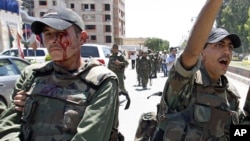Fighting between heavily armed Syrian government troops and lightly-equipped opposition forces continues as diplomatic efforts seem to make little headway.
Experts said President Bashar al-Assad’s army - estimated at between 200,000 and 250,000 troops - is by regional standards a highly-capable military force.
"When you compare it to neighboring states such as Lebanon, Jordan and Egypt, it is one of the largest forces," said Aram Nerguizian, a Syria expert at the Center for Strategic and International Studies. "It does have pockets of excellence."
Nerguizian points out "You have units like the Republican Guard and units that Maher al-Assad [President Assad's brother] controls that are markedly more effective, and there are essentially elite units and very loyal to Assad, capable in urban fighting."
But John Pike, head of an Internet research firm Globalsecurity.com, said there are limits to the army’s political reliability "because of the sectarian division between the Alawite officers and the Sunni soldiers."
Outside military help
For decades, first the Soviet Union and now Russia delivered weapons to the Syrian army. These included thousands of tanks, helicopters, heavy artillery, ammunition and armored personnel carriers.
Pieter Wezeman, an arms transfer expert with the Stockholm International Peace Research Institute, said other countries have been mentioned as possible arms suppliers to Syria, such as Iran.
"Another country which has been mentioned in some reports is North Korea'" added Wezeman, though he said it is hard to estimate the volume and number of weapons provided by Pyongyang.
Rebels lightly armed
Experts said facing a well-equipped Syrian army are insurgents armed with light weapons.
John Pike said those include assault rifles, machine guns, and rocket-propelled anti-tank rockets. "What they do not have is helicopters and tanks," said Pike. "And that is basically what the Syrian government is relying on to suppress this insurrection, is this military imbalance that the rebels have light weapons and the government has heavy weapons."
Pieter Wezeman said much of the weaponry used by the insurgents has either been captured from depots or taken from soldiers of the Syrian army who have deserted.
"There are also clear indications that the rebels have procured arms on the black market in, for example, Lebanon," said Wezeman. "And then of course there are the rumors that countries like Qatar and Saudi Arabia are also involved in supplying them arms - or at last the funds to procure arms." But Wezeman pointed out "it is very unclear what is true about these rumors and what is not."
Experts said it is difficult to predict how long the fighting in Syria will last - it has been going on for more than a year. A cease-fire that is part of a peace plan offered by joint U.N.-Arab League envoy Kofi Annan has failed to take hold.
Experts said President Bashar al-Assad’s army - estimated at between 200,000 and 250,000 troops - is by regional standards a highly-capable military force.
"When you compare it to neighboring states such as Lebanon, Jordan and Egypt, it is one of the largest forces," said Aram Nerguizian, a Syria expert at the Center for Strategic and International Studies. "It does have pockets of excellence."
Nerguizian points out "You have units like the Republican Guard and units that Maher al-Assad [President Assad's brother] controls that are markedly more effective, and there are essentially elite units and very loyal to Assad, capable in urban fighting."
But John Pike, head of an Internet research firm Globalsecurity.com, said there are limits to the army’s political reliability "because of the sectarian division between the Alawite officers and the Sunni soldiers."
Outside military help
Syrian Air and Naval Forces
Syrian Air and Naval Forces- 70,000 Air Force personnel
- 5,000 Navy personnel
- 300 fighter-ground attack planes
- 48 intelligence/surveillance planes
- 22 heavy transport planes
- 36 attack helicopters
- 100 reconnaissance/transport helicopters
Pieter Wezeman, an arms transfer expert with the Stockholm International Peace Research Institute, said other countries have been mentioned as possible arms suppliers to Syria, such as Iran.
"Another country which has been mentioned in some reports is North Korea'" added Wezeman, though he said it is hard to estimate the volume and number of weapons provided by Pyongyang.
Rebels lightly armed
Experts said facing a well-equipped Syrian army are insurgents armed with light weapons.
John Pike said those include assault rifles, machine guns, and rocket-propelled anti-tank rockets. "What they do not have is helicopters and tanks," said Pike. "And that is basically what the Syrian government is relying on to suppress this insurrection, is this military imbalance that the rebels have light weapons and the government has heavy weapons."
Pieter Wezeman said much of the weaponry used by the insurgents has either been captured from depots or taken from soldiers of the Syrian army who have deserted.
"There are also clear indications that the rebels have procured arms on the black market in, for example, Lebanon," said Wezeman. "And then of course there are the rumors that countries like Qatar and Saudi Arabia are also involved in supplying them arms - or at last the funds to procure arms." But Wezeman pointed out "it is very unclear what is true about these rumors and what is not."
Experts said it is difficult to predict how long the fighting in Syria will last - it has been going on for more than a year. A cease-fire that is part of a peace plan offered by joint U.N.-Arab League envoy Kofi Annan has failed to take hold.





